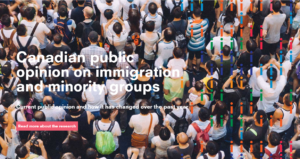Environics Institute: Canadian public opinion about immigration and minority groups
 Immigration and refugees
Immigration and refugees
Public opinion continues to be more positive than negative in terms of support for current immigration levels and the legitimacy of refugees, with sentiments a bit less polarized than before.
Many Canadians continue to say too many immigrants are not adopting Canadian values, but this view continues to wane. Worldwide, Canadians are among the most accepting of immigrants in their country.
Immigration and refugee issues have been prominent over the past year, both worldwide and in Canada. Migration levels continue to surge from conflict zones in the Middle East and elsewhere, with receiving countries struggling with accommodation and political backlash. The situation is much quieter in Canada, where more than 30,000 Syrian refugees have now been settled across the country with little apparent controversy. At the same time, record numbers of refugees have shown up at the southern border, looking for respite from new US government policies targetting undocumented residents and people from Muslim countries.
The past year has also witnessed our own unfortunate incidents of harassment and hate crimes against people of colour, which remind us that xenophobia also exists here. But how do Canadians as a people feel today about our increasingly diverse society and the treatment of people who are different?
Results of this latest survey show that Canadians as a whole continue to be more positive than negative about the current levels of immigrants coming to this country, and with the legitimacy of refugees who have been arriving. A significant proportion still believe too many immigrants not adopting Canadian values remain, but this concern continues to gradually wane over time. Moreover, results from an international survey conducted by Gallup make it clear that Canada stands out among nations as a country that accepts, if not welcomes, people from elsewhere.
As before, opinions vary somewhat across the country. Positive views about immigration and refugees continue to be more widespread in B.C., among younger generations (ages 18 to 29), Canadians with a university education, and immigrants (who now make up more than 20% of the population). This perspective is least apt to be shared in Alberta, among Canadians aged 60 plus, and those with a high school diploma.
Treatment of minority groups
Most Canadians believe there is ongoing discrimination in Canada against ethnic and racial groups, especially Muslims and Indigenous Peoples, and to a lesser extent Black people, South Asians, Jews and Chinese people. The perceived extent of such mistreatment has declined somewhat since 2015, reversing an earlier trend.
Canada is often celebrated as a diverse, multicultural country with little inter-group conflict, but discrimination and racism are a documented reality that is acknowledged by most Canadians, although there are differences in opinion about the treatment of various groups, and the extent to which each faces mistreatment in society.
Muslims, people from Middle Eastern countries, and Indigenous Peoples are most widely seen as experiencing ongoing discrimination. Black people and South Asians somewhat less so, while Jews and Chinese people are least apt to be seen as victims of such treatment. Perceptions of the frequency of discrimination has declined marginally for all groups since 2015. The reason for this shift isn’t clear from the data, but may possibly be due to the increased attention now being given to racism and sexism (e.g., Black Lives Matter, #MeToo) that might lead some Canadians to believe these problems are now being addressed more than before.
Muslims in Canada
Canadians remain largely divided in their opinions about Islam, with views worsening noticeably in Alberta (and to a lesser extent Ontario) over the past year. A plurality continues to think that most Muslims want to remain distinct rather than integrate into Canadian society.
Of all the distinct groups in Canadian society today, Muslims are most widely considered to be the “other” because of where they come from, associations with terrorism in other countries, and specific religious practices like head coverings. The non-Muslim public’s view of Muslims continues to be mixed and quite possibly ambivalent. Canadians are somewhat more likely to be positive than negative in their overall opinion of Islam, but they are more apt than not to believe that Muslims want to remain distinct from Canadian society rather than fit in.
Read the full report on the Environics Institute’s website.
Read the feature in the Globe and Mail.
Please note that Senator Omidvar currently serves on the Environics Institute’s Board of Directors.